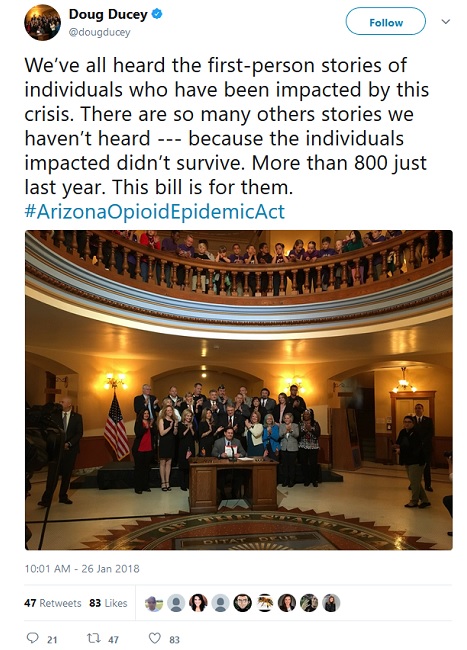The University of Arizona Center for Rural Health is partnering with the Arizona Department of Health Services and other state agencies to train first responders to recognize opioid overdoses and to administer the drug naloxone to prevent fatalities.
The effort is funded with a four-year, $3.1 million grant from the U.S. Substance Abuse and Mental Health Services Administration (SAMHSA) to the Arizona Department of Health Services (ADHS). Of the $3.1 million, $2.2 million has been awarded to the UA Center for Rural Health, at the University of Arizona’s Mel and Enid Zuckerman College of Public Health.
On June 5, 2017, Arizona Gov. Doug Ducey declared a statewide health emergency, based on ADHS data that showed from 2012 to 2016, deaths from opioid overdoses in Arizona increased 74 percent. In 2016, ADHS reported 790 opioid-related deaths – averaging more than two a day.
And the number is increasing. Over the past seven months, more than 800 people have died due to opioid overdoses, amounting to almost three deaths each day.
Gov. Ducey’s declaration allows Arizona to coordinate public health interventions, which will include training law enforcement agencies on protocols for administering naloxone (brand name Narcan), the inhaled (nasal) or injectable (intramuscular) drug used to reverse opioid overdoses and, in many cases, prevent death. According to ADHS, more than 1,000 first responders have been trained to carry and administer naloxone; more than 3,600 doses of naloxone have been dispensed, and more than 2,500 naloxone doses have been administered to help reverse opioid overdoses.
“Arizona is doing everything it can to advance statewide solutions that prevent opioid overdoses, and this partnership between the Arizona Department of Health Services and the University of Arizona will enhance our ability to save even more lives,” Gov. Ducey said. “First responders are on the front lines of this crisis, and because of this partnership, we will be able to train even more people to administer this life-saving medication.”
The UA Center for Rural Health is partnering with the ADHS Bureau of Emergency Medical Services and Trauma System to work in Arizona’s rural communities to instruct emergency medical services personnel, first responders and family and community members to screen and refer to treatment individuals at risk of opioid induced overdose or death.
The Center also is working with the Arizona Peace Officer Standards and Training Board, the UA Center for Population Science and Discovery, the UA College of Medicine – Tucson, Gov. Ducey’s office, the state’s rural and critical access hospitals, and others committed to addressing the opioid epidemic in Arizona, said Daniel Derksen, MD, MPH, director of the UA Center for Rural Health.
“The $3.1 million SAMHSA First Responders Cooperative Agreement with ADHS, and their $2.2 million interagency services agreement with us, will help build the training, education and treatment infrastructure to reduce the tragic consequences of opioid morbidity and mortality in Arizona,” Dr. Derksen added.
“Having the UA Center for Rural Health as a key partner in this initiative will foster critical links with first responders in the most underserved areas in Arizona,” said Cara Christ, MD, MS, ADHS director. “In addition, the UA Center for Population Science and Discovery will provide invaluable monitoring and evaluation that will document successes that can be replicated across the country.”
 Taylor George, DrPH, EMT-P, section chief of the ADHS Bureau of Emergency Services and Trauma System, will oversee the project. George graduated in December with a doctorate in public health policy and management from the UA Mel and Enid Zuckerman College of Public Health.
Taylor George, DrPH, EMT-P, section chief of the ADHS Bureau of Emergency Services and Trauma System, will oversee the project. George graduated in December with a doctorate in public health policy and management from the UA Mel and Enid Zuckerman College of Public Health.
The UA Center for Rural Health also is funded by the U.S. Health Resources and Services Administration (HRSA) to work with Arizona’s 14 critical access hospitals, which have 25 beds or less and are 35 miles or more from a full-service hospital in Arizona. HRSA has awarded $45,000 to each of five of Arizona’s 14 critical access hospitals, which are located in very rural areas, most in need of assistance in reducing opioid overdoses and fatalities.
On Friday, January 26, Gov. Ducey signed into law legislation to battle opioid abuse. Among other regulations, the bill will limit initial opioid prescriptions to five days, while making provisions for patients with cancer or trauma injuries and others experiencing very severe pain.
“We’ve all heard the first-person stories of individuals who have been impacted,” Gov. Ducey said at a signing ceremony.
“But there are so many other stories we haven’t heard because the individuals impacted didn’t survive. This bill is for them.”

